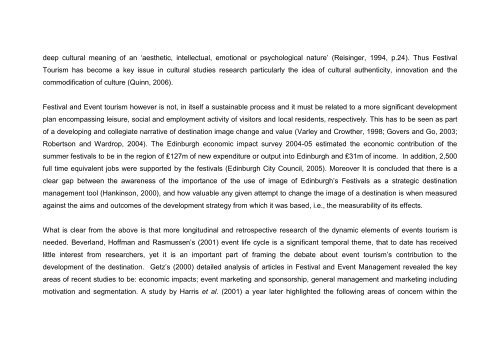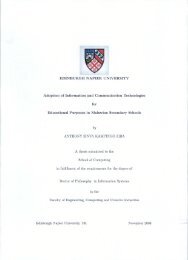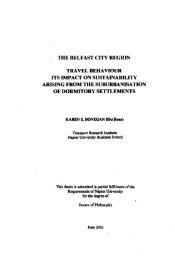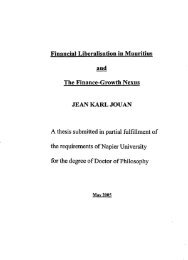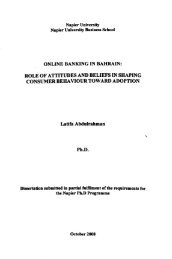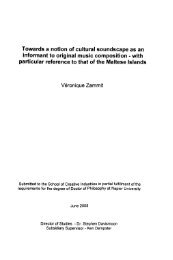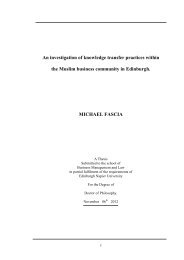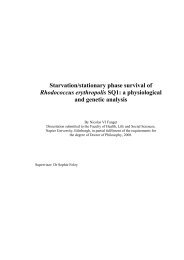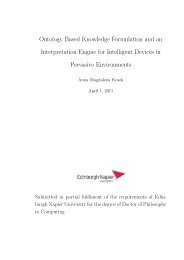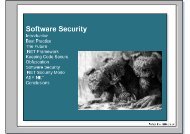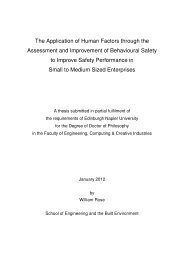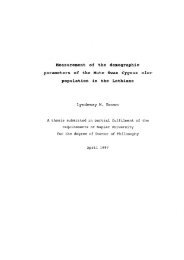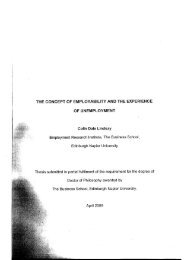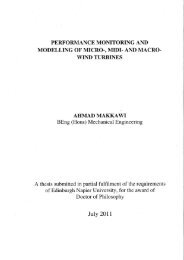The Role of Niche Tourism Products in Destination - Repository ...
The Role of Niche Tourism Products in Destination - Repository ...
The Role of Niche Tourism Products in Destination - Repository ...
You also want an ePaper? Increase the reach of your titles
YUMPU automatically turns print PDFs into web optimized ePapers that Google loves.
deep cultural mean<strong>in</strong>g <strong>of</strong> an ‘aesthetic, <strong>in</strong>tellectual, emotional or psychological nature’ (Reis<strong>in</strong>ger, 1994, p.24). Thus Festival<br />
<strong>Tourism</strong> has become a key issue <strong>in</strong> cultural studies research particularly the idea <strong>of</strong> cultural authenticity, <strong>in</strong>novation and the<br />
commodification <strong>of</strong> culture (Qu<strong>in</strong>n, 2006).<br />
Festival and Event tourism however is not, <strong>in</strong> itself a susta<strong>in</strong>able process and it must be related to a more significant development<br />
plan encompass<strong>in</strong>g leisure, social and employment activity <strong>of</strong> visitors and local residents, respectively. This has to be seen as part<br />
<strong>of</strong> a develop<strong>in</strong>g and collegiate narrative <strong>of</strong> dest<strong>in</strong>ation image change and value (Varley and Crowther, 1998; Govers and Go, 2003;<br />
Robertson and Wardrop, 2004). <strong>The</strong> Ed<strong>in</strong>burgh economic impact survey 2004-05 estimated the economic contribution <strong>of</strong> the<br />
summer festivals to be <strong>in</strong> the region <strong>of</strong> ₤127m <strong>of</strong> new expenditure or output <strong>in</strong>to Ed<strong>in</strong>burgh and ₤31m <strong>of</strong> <strong>in</strong>come. In addition, 2,500<br />
full time equivalent jobs were supported by the festivals (Ed<strong>in</strong>burgh City Council, 2005). Moreover It is concluded that there is a<br />
clear gap between the awareness <strong>of</strong> the importance <strong>of</strong> the use <strong>of</strong> image <strong>of</strong> Ed<strong>in</strong>burgh’s Festivals as a strategic dest<strong>in</strong>ation<br />
management tool (Hank<strong>in</strong>son, 2000), and how valuable any given attempt to change the image <strong>of</strong> a dest<strong>in</strong>ation is when measured<br />
aga<strong>in</strong>st the aims and outcomes <strong>of</strong> the development strategy from which it was based, i.e., the measurability <strong>of</strong> its effects.<br />
What is clear from the above is that more longitud<strong>in</strong>al and retrospective research <strong>of</strong> the dynamic elements <strong>of</strong> events tourism is<br />
needed. Beverland, H<strong>of</strong>fman and Rasmussen’s (2001) event life cycle is a significant temporal theme, that to date has received<br />
little <strong>in</strong>terest from researchers, yet it is an important part <strong>of</strong> fram<strong>in</strong>g the debate about event tourism’s contribution to the<br />
development <strong>of</strong> the dest<strong>in</strong>ation. Getz’s (2000) detailed analysis <strong>of</strong> articles <strong>in</strong> Festival and Event Management revealed the key<br />
areas <strong>of</strong> recent studies to be: economic impacts; event market<strong>in</strong>g and sponsorship, general management and market<strong>in</strong>g <strong>in</strong>clud<strong>in</strong>g<br />
motivation and segmentation. A study by Harris et al. (2001) a year later highlighted the follow<strong>in</strong>g areas <strong>of</strong> concern with<strong>in</strong> the


